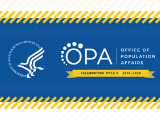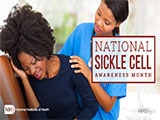Preparing Youth for Success in West Virginia
Consistent with President Trump’s Executive Order on Reducing Poverty in America by Promoting Opportunity and Economic Mobility, HHS’ Strategic Plan sets goals for HHS to encourage self-sufficiency and personal responsibility, and eliminate barriers to economic opportunity and to prepare children and youth for healthy, productive lives. This blog is part of the Self-Sufficiency Series: Solutions from the Field, which profiles local programs from across the country finding solutions to accomplish these goals.
The negative impact of poverty on a child’s education and future career is quite substantial. Youth raised in poverty often miss significant opportunities for long-term economic mobility, healthy lives, and being community assets – goals that are important to HHS. An Adolescent Pregnancy Prevention (APP) program grantee funded by the Family and Youth Services Bureau in Hurricane, West Virginia is one example of a program that aims to help youth reach their greatest potential by supporting organizations and communities that guide youth along the path of school, work, marriage, and then children – referred to by the American Enterprise Institute and others as the millennial success sequence.
West Virginia has one of the highest teen birth rates in the country. Through APP’s sexual risk avoidance education program, youth in West Virginia obtain knowledge and skills to form healthy relationships and set goals that help them postpone pregnancy until they are better equipped to support a baby financially and emotionally.
Teaching Health Instead of Nagging Kids (T.H.I.N.K.), overseen by Mission West Virginia Inc., provides evidence-based instruction to high-risk youth and young adults from 12 to 24 years old in a variety of settings, such as middle and high schools, juvenile detention facilities, group homes, residential treatment facilities, and youth emergency shelters in seven counties. The program leverages statistics and messaging that demonstrate how following the success sequence can help them avoid poverty and lay the foundation for success in the future.
During one exercise, youth visualize how to be an ideal parent from a child’s perspective. Through classroom discussion, they explore whether they are capable of being a successful parent as a high school student and, if not, what they can do to avoid becoming a parent until they are financially and emotionally prepared. After taking the final class on fatherhood, one student said, “[T]oday’s lesson really made me think. You know, about my Dad and stuff and where I’m going. It really touched me.”
One special feature of T.H.I.N.K. is that the educators take great care to avoid shaming or alienating youth who may already be parents when discussing the success sequence. Educators emphasize the importance of being the best parent they can be and encourage them to postpone a second pregnancy until they have completed the success sequence.
By integrating efforts to promote both healthy relationships and the success sequence, Mission West Virginia’s T.H.I.N.K. program is working to equip youth with the tools to successfully transition into adulthood and to become self-sufficient. HHS believes it is important to help young people achieve healthy, productive lives, and T.H.I.N.K. is one example of the many organizations that operate programs funded by the Family and Youth Services Bureau every day to help achieve that goal.

Building Your Own Safety Net
Honor National Immunization Awareness Month


